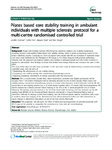Pilates based core stability training in ambulant individuals with multiple sclerosis: protocol for a multi-centre randomised controlled trial
| dc.contributor.author | Freeman, Jennifer | |
| dc.contributor.author | Fox, E | |
| dc.contributor.author | Gear, M | |
| dc.contributor.author | Hough, A | |
| dc.date.accessioned | 2015-09-29T20:30:09Z | |
| dc.date.available | 2015-09-29T20:30:09Z | |
| dc.date.issued | 2012-12 | |
| dc.identifier.issn | 1471-2377 | |
| dc.identifier.issn | 1471-2377 | |
| dc.identifier.other | 19 | |
| dc.identifier.uri | http://hdl.handle.net/10026.1/3560 | |
| dc.description.abstract |
BACKGROUND: People with Multiple Sclerosis (MS) frequently experience balance and mobility impairments, including reduced trunk stability. Pilates-based core stability training, which is aimed at improving control of the body's stabilising muscles, is popular as a form of exercise with people with MS and therapists. A replicated single case series study facilitated by the Therapists in MS Group in the United Kingdom (UK) provides preliminary evidence that this approach can improve balance and mobility in ambulant people with MS; further evidence is needed to substantiate these findings to ensure that limited time, energy, finances and resources are used to best effect.This study builds upon the pilot work undertaken in the case series study by implementing a powered randomised controlled study, with the aims of: 1 Establishing the effectiveness of core stability training; 2 Comparing core stability training with standardised physiotherapy exercise; 3 Exploring underlying mechanisms of change associated with this intervention METHODS: This is a multi-centre, double blind, block randomised, controlled trial. Eligible participants will be recruited from 4 UK centres. Participants will be randomly allocated to one of three groups: Pilates based core stability training, standardised physiotherapy exercise or contract-relax relaxation sessions (placebo control). All will receive face to face training sessions over a 12 week period; together with a 15 minute daily home programme. All will be assessed by a blinded assessor before training, at the end of the 12 week programme and at 4 week follow-up. The primary outcome measure is the 10 metre timed walk. Secondary outcome measures are the MS walking Scale (MSWS-12), the Functional Reach (forwards and lateral), a 10 point Numerical Rating Scale to determine "Difficulty in carrying a drink when walking", and the Activities-specific Balance Confidence (ABC) Scale. In addition, ultrasound imaging of the abdominal muscles will be performed before and after intervention to assess changes in abdominal musculature at one of the four centres (Plymouth). DISCUSSION: This pragmatic trial will assess the effect of these exercise programmes on ambulatory people with MS. It may not be possible to extrapolate the conclusions to those who are non-ambulatory. TRIAL REGISTRATION: ClinicalTrials.gov: NCT01414725. | |
| dc.format.extent | 19- | |
| dc.format.medium | Electronic | |
| dc.language | en | |
| dc.language.iso | eng | |
| dc.publisher | Springer Science and Business Media LLC | |
| dc.subject | Multiple sclerosis | |
| dc.subject | Mobility | |
| dc.subject | Balance | |
| dc.subject | Exercise | |
| dc.subject | Physiotherapy | |
| dc.subject | Core stability | |
| dc.title | Pilates based core stability training in ambulant individuals with multiple sclerosis: protocol for a multi-centre randomised controlled trial | |
| dc.type | journal-article | |
| dc.type | Journal Article | |
| dc.type | Multicenter Study | |
| dc.type | Randomized Controlled Trial | |
| dc.type | Research Support, Non-U.S. Gov't | |
| plymouth.author-url | https://www.webofscience.com/api/gateway?GWVersion=2&SrcApp=PARTNER_APP&SrcAuth=LinksAMR&KeyUT=WOS:000304661400001&DestLinkType=FullRecord&DestApp=ALL_WOS&UsrCustomerID=11bb513d99f797142bcfeffcc58ea008 | |
| plymouth.issue | 1 | |
| plymouth.volume | 12 | |
| plymouth.publication-status | Published | |
| plymouth.journal | BMC Neurology | |
| dc.identifier.doi | 10.1186/1471-2377-12-19 | |
| plymouth.organisational-group | /Plymouth | |
| plymouth.organisational-group | /Plymouth/Faculty of Health | |
| plymouth.organisational-group | /Plymouth/Faculty of Health/School of Health Professions | |
| plymouth.organisational-group | /Plymouth/REF 2021 Researchers by UoA | |
| plymouth.organisational-group | /Plymouth/REF 2021 Researchers by UoA/UoA03 Allied Health Professions, Dentistry, Nursing and Pharmacy | |
| plymouth.organisational-group | /Plymouth/Research Groups | |
| plymouth.organisational-group | /Plymouth/Research Groups/Institute of Health and Community | |
| plymouth.organisational-group | /Plymouth/Research Groups/Plymouth Institute of Health and Care Research (PIHR) | |
| plymouth.organisational-group | /Plymouth/Users by role | |
| plymouth.organisational-group | /Plymouth/Users by role/Academics | |
| plymouth.organisational-group | /Plymouth/Users by role/Researchers in ResearchFish submission | |
| dc.publisher.place | England | |
| dcterms.dateAccepted | 2012-04-05 | |
| dc.identifier.eissn | 1471-2377 | |
| dc.rights.embargoperiod | Not known | |
| rioxxterms.versionofrecord | 10.1186/1471-2377-12-19 | |
| rioxxterms.licenseref.uri | http://www.rioxx.net/licenses/all-rights-reserved | |
| rioxxterms.licenseref.startdate | 2012-04-05 | |
| rioxxterms.type | Journal Article/Review |


